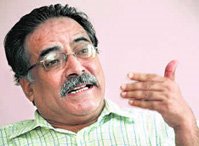Staffan de Mistura, the head of the United Nations Mission to Nepal, has expressed cautious optimism about the consensus between the seven-party government and the Maoists on the issue of the management of arms and armies.
“We are cautiously optimistic. Over the last few hours both the sides have come fairly closer,” Mistura said speaking at a press conference organised at the Tribhuvan International Airport before the team’s departure from Nepal Thursday afternoon.
He added, “If both the sides become able to adopt and announce confidence building measures we will probably help in acceleration.” He informed the mission would present it s report to the UN Secretary-General Kofi Annan by the middle of next week.
s report to the UN Secretary-General Kofi Annan by the middle of next week.
During its weeklong stay in Kathmandu, the UN Mission had held discussions with various personalities including Prime Minister Girija Prasad Koirala, ministers, leaders of the seven-party alliance, CPN (Maoist) and the foreign missions based here and had set a three-day ‘deadline’, on Tuesday, before the government and the Maoists to arrive at a consensus on how the UN should engage itself in Nepal’s peace process.
The Mission visited the regional headquarters of the Nepali Army and a temporary camp of the People’s Liberation Army (PLA) in mid-western Nepal on Wednesday.
“Nepal is a special case. For Nepal there is a need for special measures,” Mistura said at the TIA press meet. Earlier today, the UN team had met with Prime Minister Koirala and Deputy Prime Minister KP Sharma Oli on the issue of management of arms and armies.
Koirala and Maoist supremo Prachanda had held a meeting at the Prime Minister’s residence at Baluwatar last evening and discussed the UN Mission’s concern. Reports said the two sides have agreed to send a joint letter to UN Secretary General but no official word has come yet.
“We are cautiously optimistic. Over the last few hours both the sides have come fairly closer,” Mistura said speaking at a press conference organised at the Tribhuvan International Airport before the team’s departure from Nepal Thursday afternoon.
He added, “If both the sides become able to adopt and announce confidence building measures we will probably help in acceleration.” He informed the mission would present it
 s report to the UN Secretary-General Kofi Annan by the middle of next week.
s report to the UN Secretary-General Kofi Annan by the middle of next week.During its weeklong stay in Kathmandu, the UN Mission had held discussions with various personalities including Prime Minister Girija Prasad Koirala, ministers, leaders of the seven-party alliance, CPN (Maoist) and the foreign missions based here and had set a three-day ‘deadline’, on Tuesday, before the government and the Maoists to arrive at a consensus on how the UN should engage itself in Nepal’s peace process.
The Mission visited the regional headquarters of the Nepali Army and a temporary camp of the People’s Liberation Army (PLA) in mid-western Nepal on Wednesday.
“Nepal is a special case. For Nepal there is a need for special measures,” Mistura said at the TIA press meet. Earlier today, the UN team had met with Prime Minister Koirala and Deputy Prime Minister KP Sharma Oli on the issue of management of arms and armies.
Koirala and Maoist supremo Prachanda had held a meeting at the Prime Minister’s residence at Baluwatar last evening and discussed the UN Mission’s concern. Reports said the two sides have agreed to send a joint letter to UN Secretary General but no official word has come yet.
The bbc analyst is in top.find him




